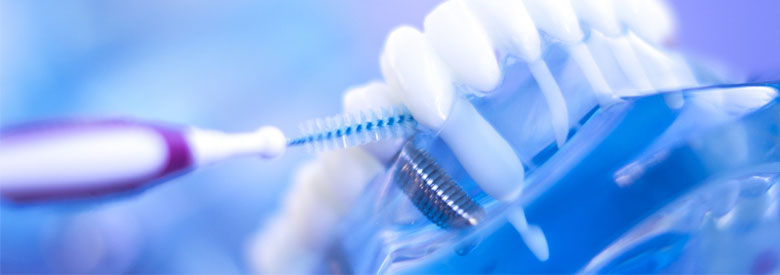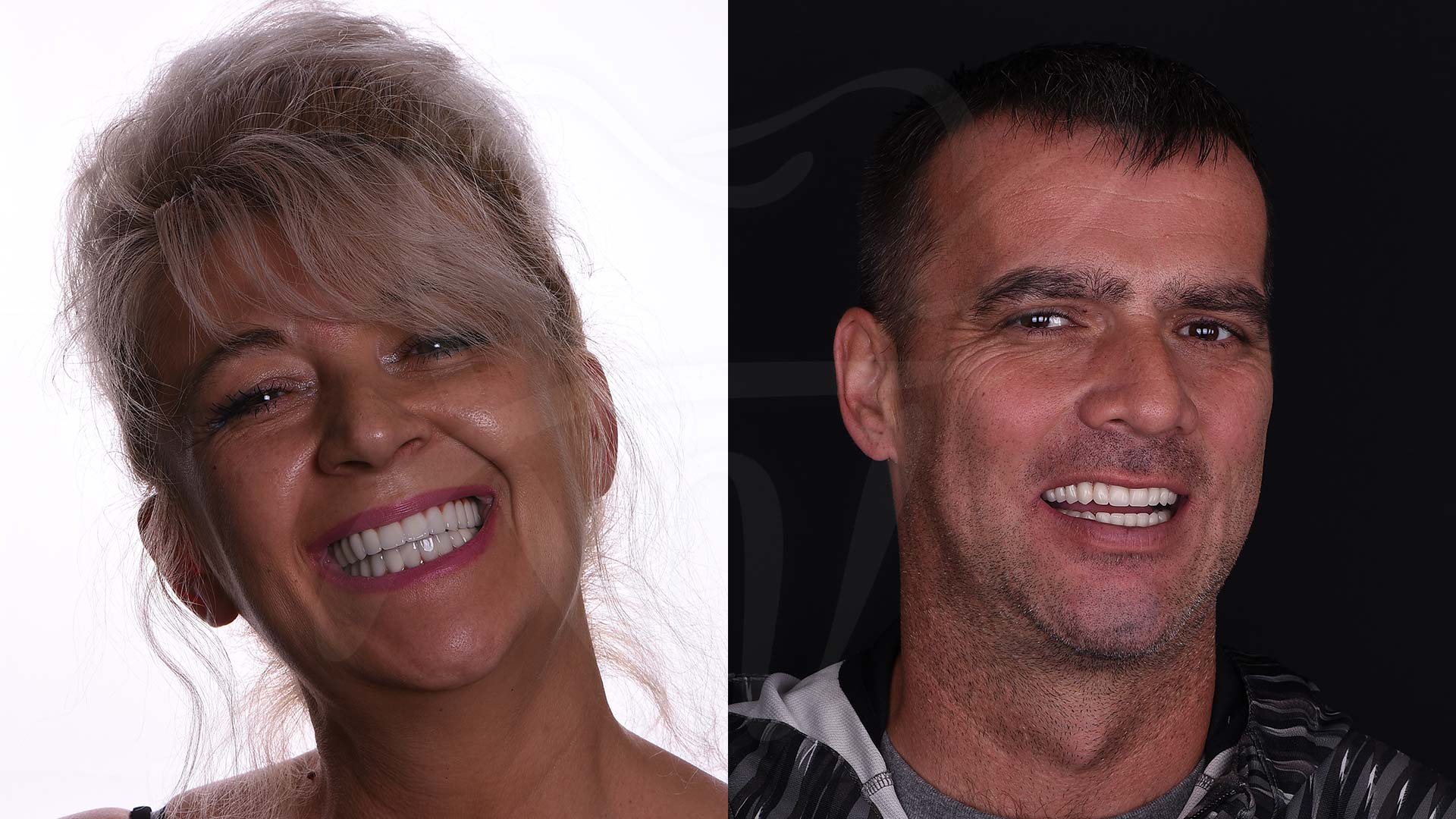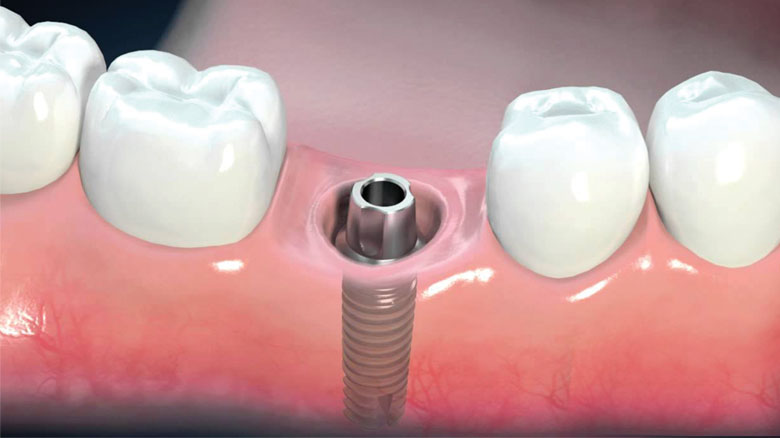
Zubni implant u potpunosti zamenjuje zub, ne samo funkcionalno i estetski, već i biološki, jer šraf obavlja važnu ulogu u vilici i ojačava viličnu kost. Veštački zubi čine govor razumljivijim, a tu je i neprocenjiva psihološka korist u vidu samopouzdanja i bolje slike o sebi, što je ključni element psiho-fizičkog zdravlja. Jednostavno rečeno, zubni implanti potpuno vraćaju sve funkcije koje su oslabljene ili nestale usled gubitka zuba.
Kako bismo pacijentima pojasnili prednosti implanata u odnosu na druge metode restauracije i vraćanja funkcije vilice, koristimo okvirno poređenje:
– Akrilatna proteza obezbeđuje 30% funkcionalnosti u odnosu na prirodne zube, dok je rešenje veoma nekomforno;
– Proteza ankerovana na implante obezbeđuje 80% funkcionalnosti u odnosu na prirodne zube i rešenje je uglavnom komforno;
– Potpuno implantsko rešenje obezbeđuje 90% funkcionalnosti u odnosu na prirodne zube i rešenje je vrlo komforno.
Ukratko, život sa implantima predstavlja pravo zadovoljstvo, pod uslovom da se higijena oko implantata dobro održava, o čemu ćemo sada reći nešto više.

Vizuelno, razlika između potpunog implantskog rada (levo) i proteze ankerovane na implantima (desno) je minimalna, međutim postoji razlika u udobnosti i funkcionalnosti.
Jedna od veoma važnih tema za pacijente koji su dobili implante jeste njihovo održavanje, ali nažalost ovom pitanju ne posvećuje se zaslužena pažnja. Naravno, samim implantima nije potrebno održavanje ali ono što je od neizmerne važnosti je održavanje higijene oko zubnih implantata i krunica kada se krunica ili implant već uveliko koriste.
Nakon ugradnje zubnog implanta i perioda srastanja sa vilicom, zubni implant je prekriven desnima i ne vidi se. Međutim, već od momenta kada se dentalni implant stavi u funkciju, odnosno kada se on otvori i na njega ušrafe abatment i zubna krunica, održavanje higijene postaje izuzetno važno. Deo kome je potrebno posvetiti najveću brigu je spoj zubnog implanta i abatmenta, jer bilo kakvo zadržavanje kamenca, zubnog plaka i bakterija u delu između abatmenta i zubnog implanta dovodi do upale desni i upale same kosti oko implanta, pri čemu dentalni implant nema mogućnost odbrane kao prirodni zub, što ovu situaciju čini potencijalno opasnom. Iako mogu postojati i drugi razlozi, za veliki procenat upala oko zubnih implanata zaslužna je upravo loša higijena.

Suština održavanja higijene oko implanata je sprečavanja ulaska bakterija u prostor oko abatmenta, koji povezuje šraf i krunicu
Implante će vlasnici najčešće nositi do kraja života, što je dodatni razlog zašto je neophodno obratiti pažnju na higijenu, a održavanje higijene daleko je lakše ako su abatment i zubna krunica individualno napravljeni tako da odgovaraju jedno drugom, tj. da se dopunjuju, i da ne ostavljaju mesta za ulaz bakterija. Ovo je jedino moguće postići odabirom individualnog abatmenta za svaki implant, dok će fabrički abatmenti ostaviti više potencijalnog mesta za bakterije. Individualni abatment će omogućiti da se polirani glatki deo nađe ispod desni, a da se veza abatmenta i krunice nalazi ili u nivou desni ili blago iznad desni, što će pacijentu dodatno olakšati održavanje higijene.
U Ordinaciji Cvejanović obuci pacijenata za održavanje njihovih protetičkih i implantskih radova pridajemo veoma veliku pažnju, jer to je najbolji način da se smanji šansa za nove dolaske radi lečenja upala. Obuka je još važnija za pacijente koji žive van Srbije i zbog toga nisu u mogućnosti da dolaze na redovne kontrole.
Na tržištu su i specijalni aparati za održavanje higijena oko dentalnih šrafova, a jedan od popularnijih je Waterpik. Zbog mogućeg nanošenje bakterija mlazom iz uređaja u sam prostor između dentalnog implanta i abatmenta, preporučujemo da se Waterpik koristi ISKLJUČIVO na najslabijoj jačini.
U novije vreme popularne su i ultrazvučne četkice, poput Philips Sonicare, koje su se pokazale kao jako efikasne, kako u svakodnevnoj higijeni, tako i sa raznim nastavcima za održavanje higijene oko implanata.
Upala desni oko implanta svakako je neželjena reakcija, ali kada se javi odmah po ugradnji implanta tada obično brzo prolazi i ne ponavlja se. Međutim, ako dođe do upale nekoliko nedelja, meseci ili godina posle ugradnje implanata, to je već razlog da hitno kontaktirate stomatologa. Razlog za upalu može infekcija (obično relativno brzo posle ugradnje) ili mikro pomeranja implanta. U ovim slučajevima upale mogu nestati brže ili postepenije, sa ili bez upotrebe lekova. Takođe, mikro pomeranje ne mora uticati na stabilnot rada, posebno ako je u pitanju ALL-ON-6, ali sve zavisi od konkretnog slučaja, zbog čega je neophodno javiti se stomatologu. U izuzetno rektim slučajevima može se ispostaviti da je pacijent alergičan na titanijum ili može doći do većih pomeranja implanta. Upala desni oko implanta je u tom slučaju samo znak ozbiljnijeg problema, i tada je često potrebno da se implant zameni.
Kada nas pacijenti pitaju da li je moguća pojava upale desni i povlačenja desni oko implanta, oni često misle na metalokeramičke krunice, koje mogu biti razlog za hroničnu upalu i povlačenje desni, ali to nema veze sa implantom, već sa metalom u krunici. Iako smo povlačenje videli na nekim starim radovima, kod naših pacijenata koji nose metalokeramičke krunice nismo registrovali upale i povlačenje desni. U svakom slučaju, metalokeramičke krunice se sve ređe koriste, dok krunice od pune keramike dokazano ne dovode do upale i povlačenja desni.
